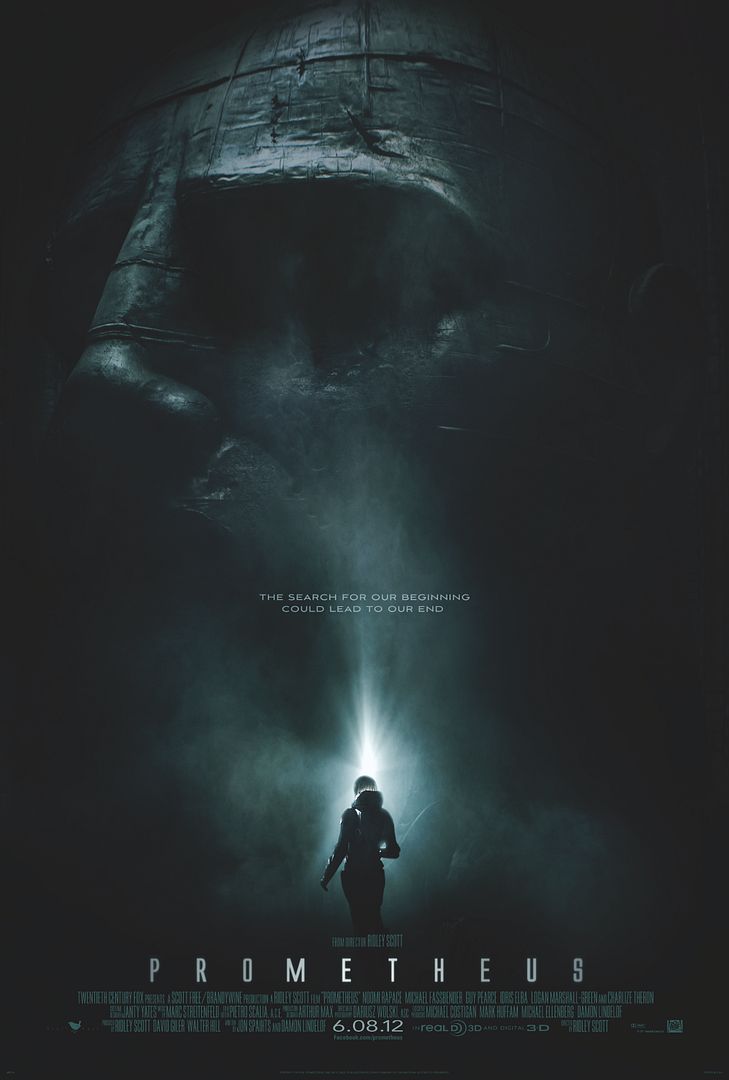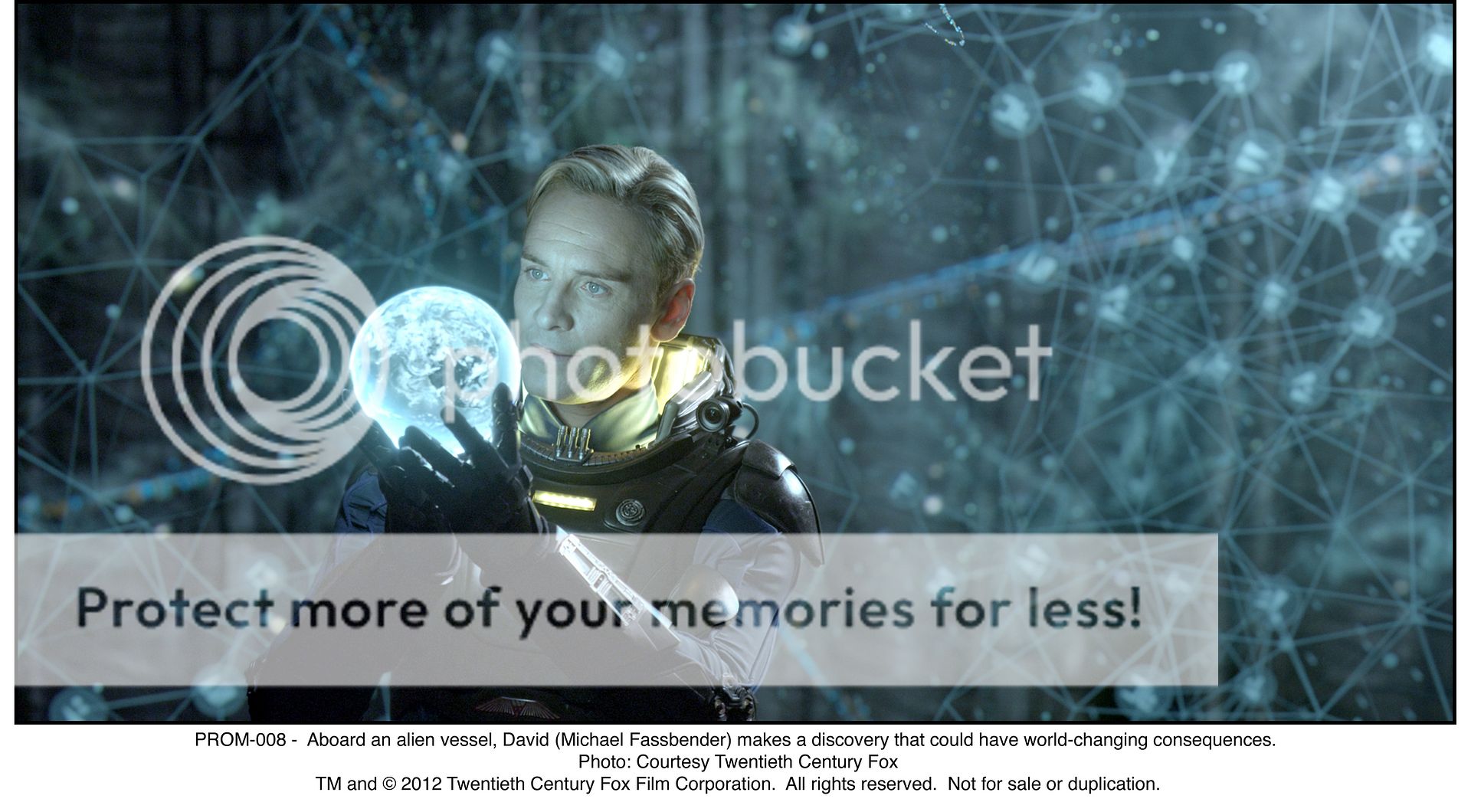
It has been three decades since Ridley Scott’s acclaimed sci-fi masterpiece Blade Runner practically reinvented the genre, and he has not made another sci-fi film since. “The reason I haven’t made another sci-fi film in so may years,” he says “is because I haven’t come across anything worthwhile for me to do with enough truth, originality and strength. Prometheus has all three.” With such heightened expectations, one would expect a bold, daring, all-encompassing storyline from Scott. Loosely based on elements from Alien, and originally intended as a prequel to that film, Prometheus meets many of those expectations, especially in visual and action content, while falling short on others. Full ScriptPhD review, under the “continue reading” cut.
Set 80 years in the future, a team of archaeologists discovers a series of cave etchings with a clue to the origins of mankind on Earth—a far-away planet in the darkest corners of the Universe. Commissioned by the corporate conglomerate Weyland Corporation, the $1 trillion scientific exploratory journey is originally intended to meet our makers in their native land. But when the team makes the shocking discovery that their makers’ paradise is a way station for a dangerous experiment in bioengineering, they begin the fight of their life to save humanity.

Interspersed within this non-stop intergalactic thrill ride are a series of conflicts between the crew members that challenge some of our most cherished scientific and philosophical ideas, conflicts we may ourselves be forced to address in the near future. The sterile, corporate (and somewhat surprisingly selfish) interests of the journey, funded by enigmatic Peter Weyland and carried out by Weyland Industries executive Meredith Vickers are in stark contrast to the spirit of scientific exploration for the sake of discovery and learning. The mission’s lead scientists are archetypes for the conflict of faith versus science. Elizabeth Shaw is deeply religious, and views the mission as a chance to meet the Gods, to affirm her faith and everything she believes in. Her partner, both in the lab and personally, Charlie Holloway is a classic adventurous scientist who is on the journey to push the envelope in the quest for answers. Finally, rounding out
the crew of 17 scientists is David, a human-replica android servant of superior intelligence created by the Weyland Corporation. David is an amalgamation of virtually every artificial intelligence character sci-fi has ever created, from Hal to C-3PO to the Terminator. Originally manufactured to tend to the ship during the two-year journey and to gather intelligence, David is nevertheless acutely aware of his superiority over his human charges. He even has the will to help them figure out the nefarious scheme of the alien predecessors and fight a battle for their survival. Responding to Holloway’s flippant response that humans made David simply because they could, he retorts: “Imagine how disappointed you’d be if your makers gave you the same response?”

Scott’s commitment to the grand scope of
Prometheus rewards the audience with a technological and engineering masterpiece of science fiction, starting with the visually arresting sets and action sequences. So extraordinary are the special effects of the scientific exploration of the alien planet and consequent battles, one would falsely assume they are CGI. But Scott built enormous sets and shot the majority of the film live in three dimensions. One production crew member called it the “greatest alien playground in the world.” The state-of-the-art spacecraft, modeled after current NASA and European Space Agency designs, was constructed with every piece of technology that would be necessary to probe the outer corners of the galaxy. Techno-geeks will salivate over sleek gadgetry like the self-operating medical pod, research labs capable of immediately isolating and sequencing single strands of DNA, travelling “mind pop” mapping devices that can isolate life, not to mention sleep-state pods where the scientists are suspended for their two-year journey. Prometheus gives a credible peek into what our science and technology capabilities will be like a hundred years from now.
Ultimately, for all of its ambition and far-reaching scope, Prometheus eventually buckles under its own weight of self-importance. The existential questions it is asking are sci-fi staples. Who are we? Where do we come from? How do we reconcile science and religion in our quest to define our identities? And finally, embodied by the advanced-technology android David, what are the parameters of responsibility in the creation of life? And what is the reason for the frailty about when and why it begins and ends? Unfortunately, the film only dabbles enough with each to titillate without ever providing fulfilling answers. The audience may finish the Prometheus quest philosophically unsatisfied, but the journey there is still an action-packed, viscerally stunning sci-fi ride.
Prometheus goes into theaters nationwide on June 11, 2012.
View the trailer:
~*ScriptPhD*~
*****************
ScriptPhD.com covers science and technology in entertainment, media and advertising. Hire our consulting company for creative content development.
Subscribe to free email notifications of new posts on our home page.

